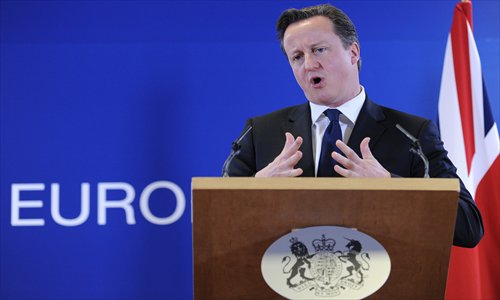In or out of the Union?
Britain's exit from the EU would be a "fatal mistake," British Conservative Cabinet Minister Ken Clarke warned Wednesday, adding that staying at the heart of Europe was in the "national interest."
Clarke made the comments at the launch of a cross-party campaign to keep Britain inside the EU. He was joined by Lib Dem Treasury Minister Danny Alexander and Labour's Lord Mandelson.
They came after David Cameron promised last week that his party would campaign for the 2015 parliamentary election on a pledge to renegotiate the terms of Britain's EU membership. An "in-or-out" referendum would then be held by the end of 2017, assuming he wins a second term.
Cameron is gambling that the EU needs Britain as much as, or more than, Britain needs the EU. Charles Grant, director of the London-based think tank Center for European Reform (CER), pointed out that the essence of the "Brexit" (British exit) threat could be summed up as "give us what we want, by the deadline that we specify, or we may well leave the EU."
However, the pledge, seen as "blackmail" by many Europeans, prompted a swift backlash from Germany and France. "A policy of cherry-picking is not an option," Germany's foreign minister Guido Westerwelle said in response to Cameron's speech.
It seems that "the gap between the minimum the Tories will demand and the maximum the EU could give is unbridgeable," as Labour's shadow foreign secretary Douglas Alexander puts it.
Euroskeptics gain momentum
Cameron is facing pressure to distance the UK from the EU from both within his own Conservative Party and the insurgent UK Independence Party (UKIP), a euroskeptic right-wing populist political party that could be a potential threat to the Tories in the next election.
Charles A. Kupchan, professor of international affairs at Georgetown University and senior fellow at the Council on Foreign Relations, told the Global Times that "Cameron is seeking to arrive at a formula that meets his political requirements at home while preserving UK membership in the EU. That formula entails loosening Britain's ties to the union."
"It was quite good politics. It will probably keep the Conservative Party under control until the next election," Stephen Tindale, associate fellow at the CER, told the Global Times.
Euroskeptics are enjoying a boost as the euro crisis worsens. David Heathcoat-Amory, a member of the Convention on the Future of Europe, argues in his book The UK and the EU: Time to Cut the Knot, that the crisis has exposed the flaws in EU construction. Efforts to rescue the euro have simply accentuated the negatives: more centralization and contempt for national democracies.
While a euro collapse would heap considerable damage upon the British economy, the more worrisome prospect for euroskeptics is a tighter EU. They believe that the EU takes powers away from their national government and poses a threat to their national sovereignty. Thus, they see the current crisis as an opportunity to construct a different relationship between the UK and the EU.
"But it was intellectually incoherent. Cameron praised the importance of the Single Market, but then said that each country should be allowed to set its own regulations. This would mean the end of the Single Market through the setting up of many non-tariff barriers," Tindale added.
Labour leader Ed Miliband said the pledge had not resolved the Tories' "headache" over the issue, and would put "Britain through years of uncertainty and take a huge gamble with the economy," the BBC reported Wednesday.
Whining and bluffing
History shows that British-EU relations have always been troubled. Referred to as the "reluctant European" for decades, British ministers are increasingly uncomfortable about the lack of leverage in their relationship with Brussels.
Ideally, they want free trade and cooperation across Europe, but to allow the UK to opt out of the project of political and economic integration. In fact, leaving the union would be the last choice as it will weaken the EU and isolate Britain.
Cameron's pledge is typical British whining and bluffing, as he said he hoped he'd be able to campaign to stay in, according to Kupchan. In Cameron's view, "the main advantage is keeping British attached to the EU," he added. "He believes the British public and Parliament will support continued membership as long as he is able to negotiate a looser affiliation with the union."
Tindale believes that Britain is not on an exit course. Cameron has to win a majority at the next election, which is far from certain. Labour and the Liberal Democrats have not called for a referendum. And the British public might vote to stay in, as they did in 1975 (even though some polls had suggested beforehand that they would vote to leave).
Still, striving for a referendum by 2018 is risky. If the UK did leave the EU, the disadvantages would be tremendous.
According to Tindale, the UK would lose the possibility of cooperating on justice and home affairs, and lose the ability to influence climate and energy policies, bringing economic and environmental disadvantages.
The economic impact would depend on whether the UK stayed part of the Single Market. If the UK follows the suit of Norway, the economic disadvantages would not be that great, but there would be a political price to pay: the UK would have no say at all over regulations, a scenario likely to be unacceptable to the UK.
"The future model is a multi-tier Europe, and Britain and a host of other EU members stay out of the euro zone and other key EU commitments," Kupchan said. "The risk is that most other countries in the outer tier will eventually enter core Europe, meaning that the UK could find itself an isolated, second-class member of the EU. That outcome would likely lead to Britain's exit from the union."
